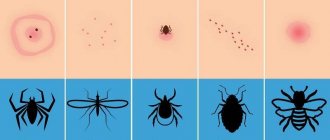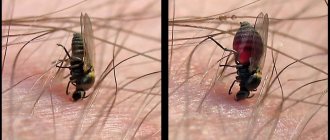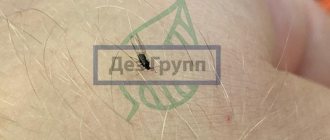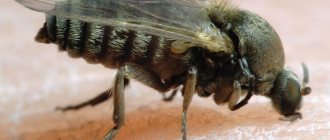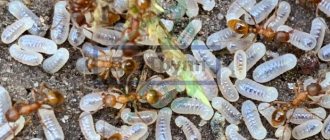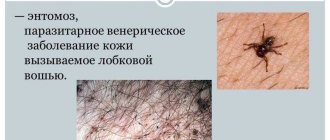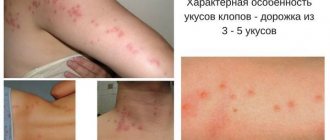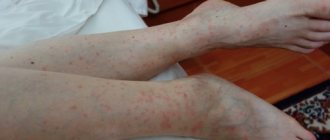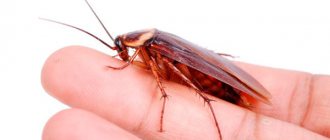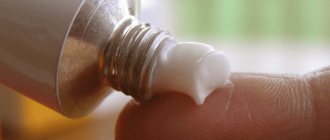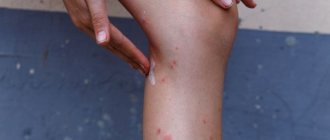The harmful effect of mosquitoes on people and farm animals is expressed in painful and uncomfortable sensations on the body after a bite, lack of quiet rest in nature and at home, and the toxic effects of saliva. Sometimes an attack by midges leads to infection of the body with infectious and invasive diseases, and in cattle - to significant loss of blood and decreased productivity.
Inflammatory and allergic reactions of the body in response to a mosquito bite occur due to irritating substances in the saliva of the parasite. These can be mucopolysaccharides, enzymes, anticoagulants and agglutinins. It is their presence that explains why the affected area of the skin itches.
In addition to the discomfort that occurs after bites, the danger of mosquitoes is associated with the transmission of pathogens of various diseases. Similar cases have been reported in different parts of the country.
:
- arboviral infections: Japanese encephalitis, West Nile fever, Sindbis virus;
- bacterial infections: brucellosis, tularemia;
- parasitic infestations: protozoal infections, filariasis.
In all dipteran insects that are included in the species composition of the midges, only females feed on the blood of humans, animals and birds. This is necessary for the successful maturation of eggs, that is, for reproduction.
What a mosquito bite looks like: photo and description
The body's reaction after an attack by blood-sucking parasites and the predisposition to allergic reactions are determined at the genetic level. According to research by scientists
, women are more attractive to mosquitoes and are more prone to acute allergic reactions.
What a mosquito bite looks like in a photo depends on many factors: the individual characteristics of the victim, the number of parasites, and the location of the bite. Facial damage can lead to serious edema in children and disrupt normal life processes. Bites on the arms and legs cause the least discomfort, provided the itching sensation is blocked.
The greatest intoxication of the body and powerful symptoms are observed with a high number of attacking blood-sucking parasites and increased sensitivity of the victim. The toxic effect of saliva in this case manifests itself most acutely in the form of local inflammatory processes and reactions of other body systems.
A bit of Wikipedia
According to Wikipedia, blood-sucking mosquitoes (lat. Culicidae) are a family of dipterous insects belonging to the long-whiskered group. In the modern world, the number of mosquito species totals more than 3.5 thousand . These insects are found on every continent (and in every country) except Antarctica, which makes sense given local temperature conditions.
Interesting fact! Humans and animals in particular are bitten exclusively by females. Males do not have developed jaws and do not have specific organs to bite a person. Human blood, rich in protein and glucose, is needed by female mosquitoes to bear offspring .
Russia and surrounding countries are home to more than 100 species of blood-sucking mosquitoes, including several malaria species (Orthopodomyia, Uranotaenia, Coquillettidia and Anopheles).
Malaria mosquito (Anopheles)
Humans are primarily responsible for the spread of various types of mosquitoes around the globe. The eggs and larvae of future adults (adult insects) survive travel in cars, trucks, trains, ships and even airplanes.
One can only guess how many larvae of malaria mosquitoes were brought by tourists from southern countries during one tourist season.
Mosquito bite: symptoms
Mosquito saliva has a toxic effect on the body of animals and humans. Red spots, swelling, puffiness, blisters, and compactions are observed on the skin. The symptoms of the manifestation depend on the species of mosquito, human immunity, tendency to allergic reactions, the degree of damage to the skin, and the number of blood-sucking parasites. The bites of malaria mosquitoes are practically not noticeable, unlike other representatives of this family. A small nodule and slight redness appear on the affected area of the skin. At the same time, if a person becomes a victim of the Aedes mosquito, within 10-15 minutes he will see:
- blister with a diameter of more than 10 mm;
- severe burning and itching;
- painful sensations;
- redness;
- when there is a high number of blood-sucking dipterans or the victim is prone to allergies - swelling and increased body temperature.
In addition to local manifestations, a mosquito bite can cause the following symptoms: deterioration in general health, increased body temperature and rapid heartbeat, changes in blood pressure and blood count (increased volume of lymphocytes and decreased number of red blood cells, hemoglobin).
Secondary manifestations of mosquito bites are local suppuration. The appearance of a secondary infection is typical when the affected area of the skin is strongly scratched with contaminated fingers or when bitten by a mosquito that carries pathogens. Cases of acute allergic reactions are less common
. Example: due to the strong effect on the body after a mosquito bite in the Komi Republic, several people were hospitalized. Severe intoxication can cause chronic glomerulonephritis.
Local inflammatory reaction
In most cases, mosquito bites lead to a local inflammatory reaction within a few minutes. The affected area of the skin experiences redness, swelling, thickening, and the person feels itching and discomfort. Sometimes blisters, necrosis, and rashes of various types form. How many hours does it take for symptoms to go away? Signs of a local allergic reaction begin to fade within 2-24 hours. In rare cases, a delayed local inflammatory reaction is observed, when symptoms can only be seen after 6-10 hours. They reach the peak of their development only after two days. Gradually, all the consequences of an attack by blood-sucking parasites disappear without any human intervention.
The most serious consequences of an attack by blood-sucking parasites can occur in patients with weakened immune systems (lymphocytic leukemia, AIDS). Their allergic reaction is severe and is characterized by an increase in body temperature and the appearance of foci of necrosis.
Severe forms of the body's reaction to mosquito bites
But there are other manifestations of a reaction to mosquito bites - papular urticaria and a systemic allergic reaction. They can occur in young children, people with hypersensitivity and intolerance to one of the components of the saliva of blood-sucking parasites.
Papular urticaria after a mosquito bite appears as itchy papules on the arms, legs, face and other exposed areas of the body. Skin formations are recurrent or chronic. Features of papular urticaria:
- develops in children 2-10 years old;
- in the first minutes after the bite, a blister with a diameter of up to 1 cm forms;
- a constantly itchy papule gradually appears;
- new rashes form sporadically;
- the disease can drag on for several years and have a chronic or cyclical course.
Systemic allergic reactions to mosquito bites are rare.
They are accompanied by local inflammation and swelling, increased body temperature, weakness, and nausea. The reason lies in the individual reaction of the body and intolerance to one of the substances contained in the mosquito’s saliva. One of the common questions and concerns people have is: “How likely is it to get malaria from a mosquito?” The spread of the disease is possible only if three conditions are met simultaneously:
- The presence of mosquitoes that carry malaria pathogens.
- Presence of parasite carriers or malaria patients.
- Optimal climate conditions (temperature and humidity) for the development of the malaria pathogen in the body of a blood-sucking parasite.
By eliminating just one factor, it is possible to eliminate the spread of malaria in the territory of the subject.
Causes of allergies
There are cases when an adult or child experiences an acute allergic reaction to bites. There may be several reasons for this:
- heredity – there are allergy sufferers in the family;
- increased sensitivity - as a result of poor nutrition (internal contamination of the body with food dyes, flavors, chemical additives), the presence of certain diseases or environmental pollution;
- immediate response of the immune system to a foreign protein.
In the presence of such reasons, the body of a person of any age, especially children, can give a strong immune response.
Allergic reaction to a mosquito bite
What to do after a mosquito bite: drug treatment
In most cases, the strategy for action after a mosquito bite is aimed at reducing itching, redness and pain. That is, the main task is to reduce symptoms. In rare cases, professional medical attention is required. This need arises if there has been a massive attack of blood-sucking parasites, and the victim is a person prone to an allergic reaction.
To prevent severe damage to the skin and constant scratching of the damaged area, it is necessary to block the sensation of itching. For this purpose, drugs containing dimethindene maleate are suitable. This is an active substance that suppresses one of the receptors and blocks the sensation of itching. If you treat an area of skin with a preparation containing this component, the permeability of capillaries will decrease and the degree of irritation will decrease. An additional advantage of dimethindene is an analgesic and mild cooling effect.
Let's consider other features of treatment after mosquito bites:
- Antihistamines and topical glucocorticosteroid drugs are prescribed when local allergic reactions occur.
- If bullous rashes have formed at the site of the bites, aseptic opening of the blisters and their treatment with potassium permanganate are used.
- To reduce the severity of local reactions, second-generation glucocorticosteroid and antihistamine medications are used.
- Urgent hospitalization is resorted to only when systemic allergic reactions of any severity, angioedema, multiple bites, and attacks of suffocation are observed. Immunocompromised patients may require immediate medical attention.
The strategy of what to do after a mosquito bite and subsequent treatment directly depends on the clinical picture. For local manifestations, general and local therapy will be sufficient. Serious swelling and severe forms of allergic reactions require the use of more powerful drugs, which must be prescribed by a doctor.
External signs
A mosquito bite may be accompanied by the following external signs:
- itching;
- swelling;
- redness of the skin.
It is quite difficult to recognize that you have been bitten by a malarial individual.
Many people, reptiles, and mammals suffer from malaria. A mosquito bite can cause the following symptoms:
- convulsions;
- tingling in the skin;
- increase in the size of the spleen;
- chills;
- joint pain;
- blood in urine;
- Strong headache;
- fever;
- vomit;
- anemia;
- cerebral ischemia.
To get rid of mosquitoes, our readers recommend the Pest-Reject mosquito repeller. The operation of the device is based on the technology of electromagnetic pulses and ultrasonic waves! Absolutely safe, environmentally friendly product for humans and pets.
A mosquito bite is deadly. Pregnant women and children are most vulnerable. The following happens in the body after a bite:
The malaria mosquito poses a real threat.
Its bite can “transmit” various infectious diseases. The course of the disease is recurrent. The malaria mosquito causes 400 million infections each year. About 1.5 million people die. 87% of infections occur in Africans, especially children under 5 years of age. Mortality is expected to double over the next 20 years.
Folk remedies for mosquito bites
To relieve itching, swelling and discomfort, you can try folk remedies for mosquito bites. They will help out if you don’t have a suitable ointment and other medications at hand:
- Essential oils help relieve itching, swelling and pain. They have anti-inflammatory, soothing, analgesic and antiseptic effects. Essential oils of lavender and tea tree will help cope with the consequences of mosquito bites. Before treating the affected skin, it is necessary to conduct a sensitivity test by dropping the solution on the elbow.
- Soda can be mixed with essential oil or water, applied to the bite site in a thin layer, or made into a cake from the resulting mixture. The product will relieve irritation and inflammation.
- Prepare a saline solution and soak a cotton pad with it generously. Apply the swab to the bite site for a few minutes.
- If a blister appears on the skin after an attack by blood-sucking parasites, a slice of raw potato will help reduce its size. For better results, it is better to grind it into a paste. This remedy is suitable for eliminating the consequences if the bite site is located in the eye area, where the use of chemical components is unacceptable.
- Parsley and cabbage leaves, crushed into a paste, help relieve itching and redness. In addition, plants improve blood circulation, reduce swelling, and have a general strengthening effect.
To reduce discomfort after a mosquito bite, any remedy that relieves itching, pain and redness is suitable. Before using it, you need to make sure that there is no allergic skin reaction to the components of the chosen folk medicine.
Preventive methods of protection
Preventive methods of protection against mosquito bites are any means that will help limit human contact with insects. This includes various repellents and insecticides that repel mosquitoes from humans, all kinds of smoldering sticks and circles. These products are sold in many stores, including supermarkets.
As for the home, it is better to have mosquito nets on the windows. If the windows are old, you can do it yourself. The main thing is to make sure that the mosquito cannot bite, since one of them may well turn out to be malarial. No bite - no problem .
And finally, advice for those who are going to hot southern countries: before the trip you should think about getting vaccinated against malaria. It is also important to take out insurance that includes a possible hospital stay in a local hospital in case of infection with one of the viruses described above.
Post Views: 740
How to protect yourself from mosquitoes
Mosquitoes interfere with a relaxing holiday not only in nature, but also at home. They enter apartments through open windows, as well as from the basement through the interior of the house - through ventilation openings and staircases. On a warm summer evening it is impossible to hide from them in the park or garden.
How can you protect yourself from mosquitoes and reduce the likelihood of being bitten?
- Avoid sweet perfumes that attract blood-sucking parasites. It is better to give preference to a fresh or sharp aroma that repels insects.
- Install mosquito nets on windows and vents.
- Apply a mixture of olive oil, clove essential oil and tea tree to your body before walking.
- Buy effective mosquito repellents and use them according to the manufacturer's instructions on clothing.
The greatest concentration of mosquitoes is observed in the evening near water bodies. If you are camping on the shore of a lake with a tent, a fire will help you escape from annoying parasites.
Why do mosquitoes bite people?
The question is simple, but at the same time, complex. This may come as a revelation to some, but human blood is not the main food item in the mosquito diet. This type of insect mainly feeds on pollen and nectar of plants, and blood is needed exclusively by females to bear new offspring.
Reproduction and birth of mosquitoes
Having received a portion of human blood, rich in proteins, the female mosquito looks for water to lay eggs, which in a short time will turn into pupae, and new mosquitoes will emerge from them. The process of “birth” of new individuals occurs directly in the water. Now do you understand why in summer there are many more mosquitoes near reservoirs than in fields, for example?
Professional mosquito treatment
If you want to get rid of blood-sucking parasites in your summer cottage, contact the Dez Group SES for help. Only professional mosquito repellent treatment will allow you to forget about discomfort and give you a relaxing holiday in nature. The company’s specialists use certified and proven drugs with a prolonged action to combat blood-sucking individuals. The effect of the insecticide is enhanced by the method of applying it using a fog generator.
If you want to clarify the cost of treating an object against mosquitoes, ask questions and find out other details of the procedure, leave a request on the company’s website. A Dez Group representative will contact you in a few minutes.
Patient's appearance
A malaria patient looks apathetic. He often experiences weakness, so for the most part the person remains in bed. The skin is pale and moist. The skin is icteric. Often the patient is exhausted. The presented symptoms are characteristic of fever. The fever is often followed by high sweating. Yellowness of the skin indicates the duration of the disease, damage to the spleen and liver.
If you are bitten by a malaria mosquito, you may experience a general or local reaction. At the site of the bite there is inflammation, swelling, and burning pain. After a couple of hours, the initial symptoms disappear.
Often a person experiences a stressful condition. It is based on overexcitation of the body. If a person is hypersensitive to poisons, an allergic reaction may occur. It is marked by reactions such as asthma, urticaria, anaphylactic shock.
First aid is to wash the wound with alcohol. Something cold should be applied to the fireplace. Next, the bitten person is put to bed and given strong coffee or tea. If vascular or cardiac activity declines, the following is administered:
- cordiamine;
- caffeine;
- adrenaline subcutaneously.
If the patient's condition has not improved, he should be urgently sent to a medical facility. A person is given “Suprastin” or “Diphenhydramine” - 1 tablet (against allergies).
Where there is a threat of being bitten by a malaria mosquito, everything should be done to destroy the source of infection. Mosquitoes can become carriers of anthrax, malaria, and intestinal infections. If there are cases of infection with dangerous diseases, they should be treated by a specialist.
To prevent a bite, use repellents and protective nets, and lubricate the skin with other products. If this is not the case, use gauze or handkerchiefs to cover exposed parts of the body.
Regular parsley will help relieve itching.
Pluck it, mash it and lubricate the affected area with the juice of the plant. After 20 minutes, there will be nothing left on the body except a reddish spot, reminiscent of a syringe mark.
Who do mosquitoes love?
To be honest, I didn’t understand the hype around mosquito bites before and why everyone is so afraid of them. But one day we found ourselves in the wilds of a very dense forest. The mosquitoes there never saw people. At first I didn’t even understand why there was such background noise in the forest. And they were the ones squeaking. And no repellents bothered them at all - they were so hungry.
When we cooked buckwheat over the fire, the hungry insects went completely crazy. They rushed into the warmth of the boiled porridge and stuck their proboscis into it. It became clear that at night we would all simply be gnawed to the bones, and we hastily retreated to another place.
After that, I realized that a lot depends on the area of residence, the season, the level of hunger of mosquitoes, the person himself and his psychological fortitude. Some people get bitten more, some less. I’m not sure whether mosquitoes love any particular blood type more, but it’s a fact that they flock more actively to a person who sweats a lot. They hardly touch me, I hardly even use sprays, but my husband just goes crazy from the bites and rushes through the blueberry thickets like a bull maddened by horse flies.
And of course, there are people with a pronounced reaction to mosquitoes; children with delicate and sensitive skin often suffer.
Possible consequences
Mosquitoes spread the following diseases:
- malaria;
- different types of tropical fever;
- dirofilariasis;
- meningitis;
- tularemia.
Bedbugs spread infections:
- typhoid fever;
- smallpox;
- brucellosis;
- anthrax;
- hepatitis B
With multiple attacks of bedbugs, anemia and anaphylactic shock are possible. There is a known case where a person was attacked by insects about 500 times during the night.
Parasites do not transmit HIV or other blood-borne diseases.
HIV is not spread by parasites.
The pest's saliva can cause allergies. Then the following symptoms are observed:
- temperature increase;
- headache;
- allergic dermatitis and rashes on the body;
- labored breathing;
- swelling of the mucous membranes.
The bite site is itchy, so there is a danger of scratching it. Children are especially susceptible to this because it is more difficult for them to control themselves.
Wounds form, and infection that gets into them can cause blood poisoning.
Whose bite is more dangerous for humans?
Both types of bites are classified as mild damage to the epidermis. But bedbug attacks are more dangerous because they disturb a person's sleep. Not being able to get enough sleep, he becomes irritable and lethargic. A subconscious fear develops, preventing you from falling asleep even in the absence of insects.
Bedbug attacks disrupt a person's sleep.
Parasites of both types carry diseases, and in this regard their bites are equally dangerous.
